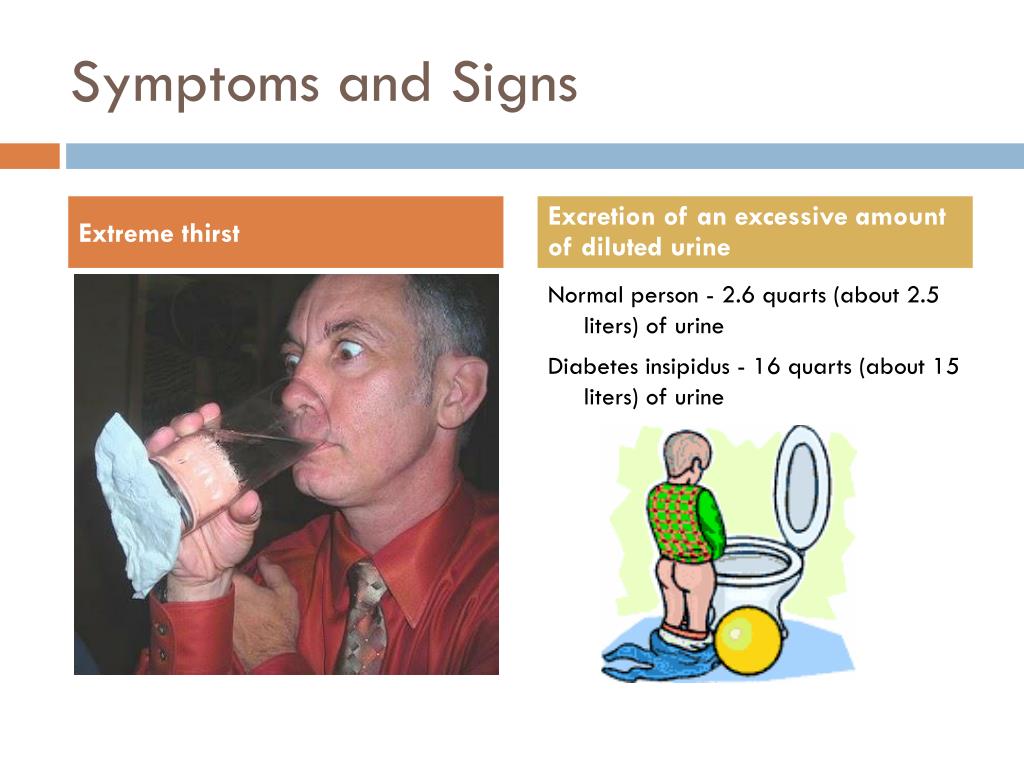Diabetes Urin Insipidus
Diabetes insipidus (di) is characterized by polydipsia and polyuria with a dilute urine having a specific gravity less than 1. 010, hypernatremia, and dehydration. it results either from a deficiency of arginine vasopressin (avp), termed central di (cdi), or from renal resistance to the action of avp, called nephrogenic di (ndi). Nephrogenic diabetes insipidus. since the kidneys don't properly respond to adh in this form of diabetes insipidus, desmopressin won't help. instead, your doctor may prescribe a low-salt diet to help reduce the amount of urine your kidneys make.
If you have diabetes insipidus, your urine will be very dilute, with low levels of other substances. a large amount of sugar in your urine may be a sign of type 1 or type 2 diabetes rather than diabetes insipidus. vasopressin test. after the water deprivation test, you may be given a small dose of avp, usually as an injection. Diabetes insipidus (di) is a condition characterized by large amounts of dilute urine and increased thirst. the amount of urine produced can be nearly 20 liters per day. reduction of fluid has little effect on the concentration of the urine. complications may include diabetes urin insipidus dehydration or seizures. Diabetes insipidus is a condition where the body fails to properly control water balance, resulting in excessive urination. excessive production of dilute urine in diabetes insipidus is often.

What is diabetes insipidus? diabetes insipidus is a rare condition that causes your body to make a lot of urine that is "insipid," or colorless and odorless. most people pee out 1 to 2 quarts a. Conversely, nephrogenic diabetes insipidus is treated with medications designed to increase concentration of the urine such as thiazide diuretics, chlorothiazide or chloropropamide. diabetes insipidus is a condition that, although not curable, can be successfully managed if diagnosed and treated in time. Diabetes insipidus urine specific gravity concerns 14401 views urine specific gravity is a laboratory test, ordered by a medical provider, which shows the concentration levels of all chemical particles that happen to be in the urine.
Diabetes insipidus and nonobstructive dilation of urinary tract. urology 1980; 16:266. ulinski t, grapin c, forin v, et al. severe bladder dysfunction in a family with adh receptor gene mutation responsible for x-linked nephrogenic diabetes insipidus. Diabetes insipidus (di) is a metabolic disorder characterized by an absolute or relative inability to concentrate urine, resulting in the production of large quantities of dilute urine. Why does diabetes insipidus cause clear urine? your kidneys reabsorb more water and put out concentrated urine. if you've had plenty to drink, adh levels fall and what comes out is clear and.
Diabetes Insipidus Symptoms And Causes Mayo Clinic
what you need to know diabetes insipidus is a rare but treatable condition that typically presents with extreme thirst (polydipsia) together with the passing diabetes urin insipidus of large amounts of dilute urine (polyuria). distinguishing these symptoms from those of primary polydipsia, diabetes mellitus, and causes of urinary frequency without polyuria can be challenging. Type 1 and type 2 diabetes. polyuria is often one of the first signs of diabetes. the condition makes sugar build up in your bloodstream. if your kidneys aren’t able to filter it out, it. Diabetes insipidus (die-uh-bee-teze in-sip-uh-dus) is an uncommon disorder that causes an imbalance of fluids in the body. this imbalance makes you very thirsty even if you've had something to drink. it also leads you to produce large amounts of urine. while the terms "diabetes insipidus" and "diabetes mellitus" sound similar, they're not related.
Diabetes Insipidus Causes Symptoms And Treatment


While in the case of diabetes mellitus, the urine so secreted is of normal concentration, in the case of diabetes insipidus the quality of urine is usually diluted due to the nature of the disease. finally, you can find traces of ketone bodies in the urine in case of diabetes mellitus. however, the same is not true for diabetes insipidus. Introduction. diabetes insipidus (di) is a disorder in which polyuria due to decreased collecting tubule water reabsorption is induced by either decreased secretion of antidiuretic hormone (adh; central di) or resistance to its renal effects (nephrogenic di). Diabetesinsipidus can happen because of kidney problems or an issue in the brain from surgery, a tumor, infection, or a head injury. pregnancy. mothers-to-be can get gestational diabetes insipidus. Diabetes insipidus urine osmolality is also typically much lower that the normal averages that are reported in this guide. generally anything under 300 mosm/kg of water is going to point toward this health condition, but results in the 200 mosm/kg range is considered a hallmark for diabetes insipidus diagnosis.
Polyuria: symptoms, causes, diagnosis, treatment.

Diabetes & urination: what’s your urine color tells you?.

Cranial diabetes insipidus is considered mild if you produce approximately 3 to 4 litres of urine diabetes urin insipidus over 24 hours. if this is the case, you may be able to ease your symptoms by increasing the amount of water you drink to avoid dehydration. More diabetes insipidus urin images. Diabetes mellitus and diabetes insipidus share the first word of their name and some of the same symptoms. but that’s where the similarities end. these two diseases aren’t related. they cause. Treatment for frequent urination or constant thirst depends on the patient’s type of diabetes insipidus: central diabetes insipidus. a synthetic, or man-made, hormone called desmopressin treats central diabetes insipidus. the nephrogenic diabetes insipidus. in some cases, nephrogenic diabetes.
You might notice: extreme thirst peeing a lot (your doctor might call this polyuria) getting up to go a lot at night preference for cold drinks dehydration unexplained weakness muscle pains irritability. Diabetes insipidus urine specific gravity urine specific gravity is a laboratory test, ordered by a medical provider, which shows the concentration levels of all chemical particles that happen to be in the urine. once a urine sample is provided, this test can be performed right away.
When your body doesn't make enough adh, the condition is called central diabetes insipidus. if you make enough but your kidneys can't respond to it, you have nephrogenic diabetes insipidus. in. Diabetes insipidus (di) is a condition characterized by large amounts of dilute urine and increased thirst. the amount of urine produced can be nearly 20 liters per day. reduction of fluid has little effect on the concentration of the urine. complications may include dehydration or seizures.. there are four types of di, each with a different set of causes. Diabetes insipidus is a rare disorder that occurs when a person's kidneys pass an abnormally large volume of urine that is insipid—dilute and odorless. in most people, the kidneys pass about 1 to 2 quarts of urine a day. in people with diabetes insipidus, the kidneys can pass 3 to 20 quarts of. Generally anything under 300 mosm/kg of water is going to point toward this health condition, but results in the 200 mosm/kg range is considered a hallmark for diabetes insipidus diagnosis. nephrogenic diabetes insipidus will typically have urine osmolality results that are less than 200 mosm/kg of water even if the clinical signs are pointing toward hypovolemia, which is a decreased blood volume.
Diabetes insipidus overview. diabetes insipidus (die-uh-bee-teze in-sip-uh-dus) is an uncommon disorder that causes an imbalance of fluids symptoms. if your condition is serious, urine output can be as much as 20 quarts (about 19 liters) a day if you're causes. the female urinary system —. Diabetes insipidus is an uncommon condition that causes excessive production of very diluted urine and, as a result, intense thirst. in healthy individuals, antidiuretic hormone (adh, also called vasopressin) helps the kidneys correctly regulate the amount of water in the body.
Comments
Post a Comment